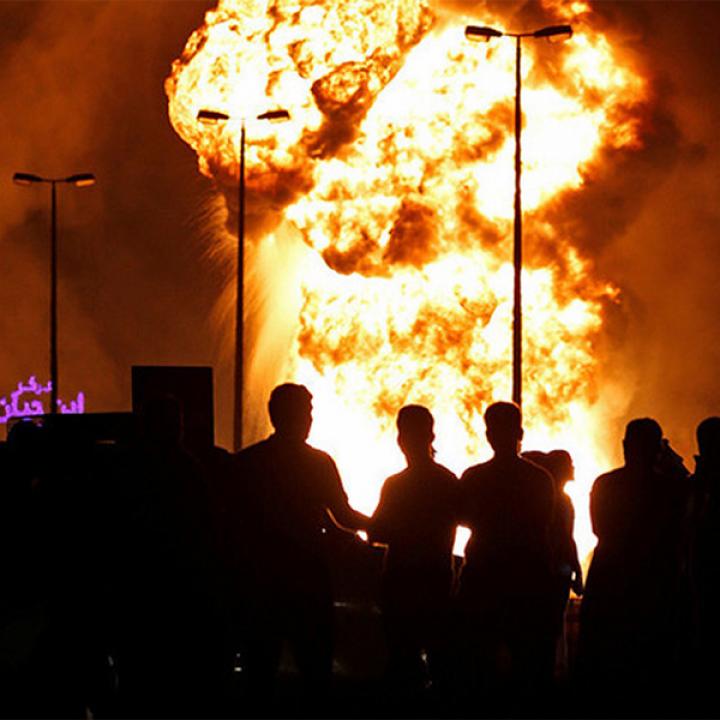
- Policy Analysis
- Policy Alert
Bahrain Pipeline Explosion Seen as a Warning from Iran

The incident, a few miles from the headquarters of the U.S. Fifth Fleet, could portend escalating regional tensions.
Saudi crude oil is reported to be flowing again through the Bahrain pipeline damaged by an explosion late on November 10. No one was injured in the blast, which sent a plume of flames high into the sky, damaging cars and nearby buildings. As yet, there has been no claim of responsibility, although the Bahraini government has described the incident as an "intentional act of sabotage," blaming terrorists acting under instruction from Iran. For its part, Iran has denied any involvement.
Although oil was discovered in Bahrain before it was ever found in Saudi Arabia, the island's actual reserves are very small. The pipeline affected, meanwhile, runs from the Saudi offshore Abu Safa oil field via a circuitous route across the Saudi mainland. Revenues from the field's production are an important subsidy to Bahrain's budget. The crude is refined at Bahrain's refinery at Sitra, on the east coast of the island.
One oil industry publication suggested, "It is more likely than not that Iran chose [the attack] as a plausibly deniable response to Saudi Arabia's perceived recent escalation against Iranian influence in Lebanon."
The explosion occurred at Buri, a Shia town where the pipeline runs exposed on the surface rather than being underground. Buri, along with other Shia towns and villages, is off-limits to U.S. diplomatic and naval personnel based on the island, according to a map on the website of the U.S. embassy in the capital, Manama.
Tension between the island's Shia Muslim majority and the government, dominated by the Sunni Muslim royal family, led by King Hamad bin Isa al-Khalifa, has often led to violent clashes between pro-Iran Shia youth and security forces. Although U.S. citizens have not been targeted or attacked, on November 2 the embassy issued a warning anticipating widespread protest activity in the subsequent few weeks that "may include attempts to disrupt traffic, protests near economic centers, tire fires, throwing of Molotov cocktails, and the isolated use of improvised explosive devices and homemade weapons targeting [Ministry of Interior] police. There remains a possibility for clashes to take place between police forces and the protesters."
A statement issued after a Bahraini cabinet meeting on November 13 linked the explosion to "Iranian meddling in the region," including a reference to the firing of a ballistic missile ten days earlier from Yemen toward the Saudi capital, Riyadh. It said "terrorist elements involved" would be "confronted firmly and severely by the force of law."
The Bahraini authorities have a dilemma. They need to respond to this incident while not causing demonstrations that could disrupt forthcoming international events being hosted on the island, including an "Iron Man" competition and the annual Manama Dialogue, a Gulf policy talkfest where Defense Secretary James Mattis is due to speak. For its part, Washington wants to deflect any attention away from the status of the Fifth Fleet headquarters. Over the years, the base, a crucial component in deterring Iranian naval aggression, has not been a political issue in government-Shia tensions, except in the case of extremists who call for its closure.
In the Gulf region as a whole, still the most important source of oil for the world economy, all oil and gas installations are vulnerable to sabotage and particularly military attack. The Bahrain pipeline incident should be a wakeup call for all players not to take comparative calm -- and consequent low prices -- for granted.
Simon Henderson is the Baker Fellow and director of the Gulf and Energy Policy Program at The Washington Institute.



